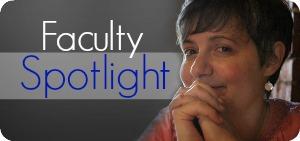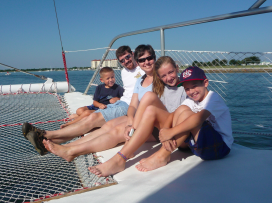
Clinician, administrator, educator, wife, and mom are just some of her roles. Take a deeper dive in to the life of Marie Carlson, MD.
How long have you been at Duke?
I've been at Duke since I started medical school in 1996 and stayed on for internal medicine residency, finishing in 2003. I worked for the community PDC in Johnston County for 3 years in traditional, otherwise known as "old-fashioned" primary care, where I did both outpatient medicine and followed my own patients in the hospital. I came back to big Duke and the Durham VA in the fall of 2006 and have been in the division since I completed residency in 2003.
What are your responsibilities within the division?
Currently, I am the section chief for hospital medicine at the Durham VA. We have a talented group of 18 who provide care on a non-teaching service 24/7 and serve as attending physicians on the VA general medicine teaching service. We also work on multiple VA committees and quality improvement projects, precept at morning report for interns and residents, help manage outside hospital transfers, and consult on surgery and psychiatry services.
What does a typical day for you look like?
It varies, depending on what service I am on. Attending on general medicine is a long day and we do 7 on, 7 off. The hospitalist service has continuity Monday-Friday and Friday through Monday. We also rotate on admitting shifts and overnight shifts. As chief, I have a good amount of administrative time which is dedicated to work for our section, but also work for the hospital on coding and physician productivity, utilization management, quality improvement, and patient safety. I am never bored!
How did you get into this field?
I came back to the VA in 2006 initially to work in primary care and with the GME program on an education grant that started a general medicine consult service at the VA. Gradually it became evident that attending physicians in hospital medicine were needed at our VA for multiple reasons--increasing pressures on VA physicians to participate in meaningful quality improvement, shrinking hours by housestaff but no reduction in workload or patient care needs, increasing medical complexity of all patients including those not on the medical service. While I became a hospitalist by evolution, I love being able to help guide a patient through such a complex experience and help train young physicians to do the same.
How has your subject area changed (or where you see future changes)?
Hospital medicine was very new in 2003--all the hospitalists in Wake County fit in one back room in a restaurant! We have grown from 3 part-time hospitalists to 13 full-time and 5 NP/PA hospitalists providing 24/7 care and a reliable presence on the teaching service. Adaptation to need has been the name of the game, so the specialty tends to attract flexible, thoughtful, collegial, creative minds. Now that the specialty is more ingrained and how to provide this type of inpatient care is a little better laid out, hospitalists are focusing on expanding their academic presence and turn their experiences in quality improvement into meaningful change for larger patient populations. As our specialty colleagues become more focused with each technologic advance, the ability to take care of patients in the hospitals becomes more difficult to do and more difficult to teach; I anticipate that hospitalist services will continue to grow to fill that gap.
What passions or hobbies do you have outside of the division?
I have three children, Anna who is 17, Aidan who is almost 13, and Asher who is 10--so most of my free time is spent watching sports or going to school events. But when I do have a free moment I love to read, especially non-fiction and medical history, swim, and re-finish furniture.
Have you recently read any books, articles, blog posts or other material that would be of interest to the division?
I am getting ready to dive in to "Let Me Heal" by Kenneth Ludmerer. During my career I have lived through both the unrestricted work hours era as a student and resident and the restricted work era as an attending, and I have seen the deterioration of dedicated time to teaching trainees on the wards. The old methods of teaching don't seem to work effectively so I am in the hunt for new tricks for improving the education experience and deflecting trainee burn-out.
What is a fun fact about you that people may not know?
I'm sure this doesn't constitute a "fun" fact as it was many things but not fun...however, it is important to me and to my growth as a physician. I was diagnosed with acute myelogenous leukemia in December 2013 and had a stem cell transplant in May 2014 and now have chronic GVHD (graft v. host disease). So I have experienced both life-threatening illness and the burden and fear that goes with chronic illness. I see my patients in a different light now, and the experiences of patients I knew who had been through cancer were such a comfort to me then. I remembered their words, and I try to pass them forward. Like Stephen Colbert said about the death of his father and brother, "I love the thing that I most wished had not happened."